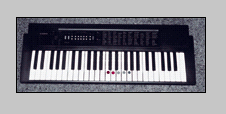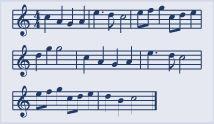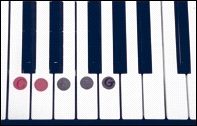|
Approach: One
to one |
| Focus:
Playing note
patterns on a electronic keyboard, maintaining them against a melody,
and inventing note patterns to fit with a melody. |
 |
140k |
Resources:
Electronic keyboard,
video recording on a laptop computer. |
|
Questions
/ instructions:
 |
 |
|
Keyboard
with keys indicated
|
Note: The video
volume should be lower than the keyboard volume.
This activity is explained to you on the video. You will be using the
keyboard, but only the notes that have coloured dots on them. Before
I start the video, you can practise playing those notes on the keyboard
so that you know what they sound like. You can do that now.
Allow the student some time to become familiar with the marked keyboard
notes. Then play video. If necessary, stop and restart the video to
allow the student to keep with the music.
Prompt: You
don't have to use all the green notes to make your pattern.
Prompt:
Make a simple pattern — it doesn't have to be a tune.
|
| |
|
|
%
responses
2000 (1996)
|
|
y4
|
| 1.
RHYTHM |
|
|
|
Pattern
to Maintain
|
 |
I'm going to play a rhythm
on the keyboard using the notes marked with red dots. Listen as I play this rhythm.
Now I'll play that rhythm again, but I want you to play with me, look at the keyboard
as you play, don't look at the video screen, I'll count to 4 and then start. .
. .1, 2, 3, 4
|
|
| Rhythm
plays. |
|
| This
time I'm going to play a tune as well as the rhythm, and I want you to
keep on playing the rhythm, using the notes marked with red dots [C, D]
again. I'll count to 4 then start, here we go. . . 1, 2, 3, 4 |
|
| Rhythm
and tune plays. |
|
| |
Maintain
pattern with melody |
throughout
or most of time
|
40
(43)
|
| |
late
arrival at pattern
|
9
(15)
|
| |
early
loss of pattern
|
22
(16)
|
| |
pattern
not achieved
|
29
(26)
|
| 2.
RHYTHM |
|
|
|
Pattern
to Maintain
|
 |
I'm going to play another
rhythm on the keyboard, using those same notes that are marked with red
dots [C,D]. Listen as I play it. |
|
| Rhythm
plays. |
|
| I'm
going to play that rhythm again, and I would like you to play it with
me. Again look at the keyboard as you play, don't look at the video screen.
I'll count to 4 then we'll start. . .1, 2, 3, 4. |
|
| Rhythm
and tune plays. |
|
| Once
again, I'm going to play a tune as well as that rhythm, and I want you
to keep on playing that rhythm using the notes marked with red dots [C,
D] again. I'll count to 4 then we'll start. . .1, 2, 3, 4. |
|
| Rhythm
and tune plays. |
|
| |
Maintained
pattern with melody |
throughout
or most of time
|
39
(44)
|
| |
late
arrival at pattern
|
7
(9)
|
| |
early
loss of pattern
|
13
(9)
|
| |
pattern
not achieved
|
41
(38)
|
| 3.
RHYTHM |
|
|
Pattern
to Maintain
|
 |
Now I'm going to play
a rhythm using the green dots [E, F, G]. Listen as I play. |
|
| Rhythm
plays. |
|
| Now
I'll play that rhythm again, and I want you to play with me. Look at the
keyboard as you play, don't look at the video screen. I'll count to 4
then we'll start. . .1,2,3,4. |
|
| Rhythm
plays. |
|
| This
time I'm going to play a tune as well as the rhythm, and I want you to
keep on playing the rhythm marked with the green dots [E, F, G] again.
I'll count to 4 then we'll start. . .1,2,3,4. |
|
| Rhythm
and tune plays.
|
|
| |
Maintained
pattern with melody |
throughout
or most of time
|
36
(43)
|
| |
late
arrival at pattern
|
6
(9)
|
| |
early
loss of pattern
|
13
(10)
|
| |
pattern
not achieved
|
45
(38)
|
| 4.
RHYTHM |
|
|
Pattern
to Maintain
|
 |
Now I'm going to play
a different rhythm, using the green dots [E,F,G]. Listen as I play. |
|
| Rhythm
plays. |
|
| Now
I'll play that rhythm again, and I want you to play with me, Look at the
keyboard as you play, don't look at the screen. I'll count to 4 then we'll
start . . .1,2,3,4.
|
|
| Rhythm
plays. |
|
| This
time I'm going to play a tune as well as the rhythm, and I want you to
keep on playing the rhythm, using the notes marked with the green dots
[E, F, G] again. I'll count to 4 then we'll start . . .1,2,3,4. |
|
| Rhythm
and tune plays. |
|
| |
Maintained
pattern with melody |
throughout
or most of time
|
27
(33)
|
| |
late
arrival at pattern
|
7
(10)
|
| |
early
loss of pattern
|
13 (13)
|
| |
pattern
not achieved
|
53
(44)
|
| 5.
TUNE |
|
| To
finish off, I'm going to play a tune and you can make up your own
rhythm using any of the green dots [E, F, G]. Listen as I play the
tune, and I'll count 4 to start with . . .1,2,3,4. |
|
Tune
to Accompany
|
 |
|
| Tune
plays. |
| Now
I'm going to play that tune a few times, and I want you to make
up a rhythm that you will play on the green dots [E, F, G]. Right
are you ready? Here is the tune. . . 1,2,3,4. |
| Tune
plays. |
|
|
| |
Create
pattern to fit with this melody |
appropriate rhythm and timing all of the time
|
3
(7)
|
| |
some
of the time
|
31
(38)
|
| |
none
of the time
|
66
(55)
|
| |
choice
of pattern complex
|
23
(21)
|
| |
simpler
|
34
(46)
|
| |
never established
|
43
(33)
|
 |
Commentary:
This task was about playing note patterns to accompany melodies. Only about one
third of the students succeeded. Overall, there was a modest decline in performance
from 1996 to 2000. It would have been more appropriate to use the term "keyboard
patterns" in the instructions for this task, as in the year 8 version.
|
|